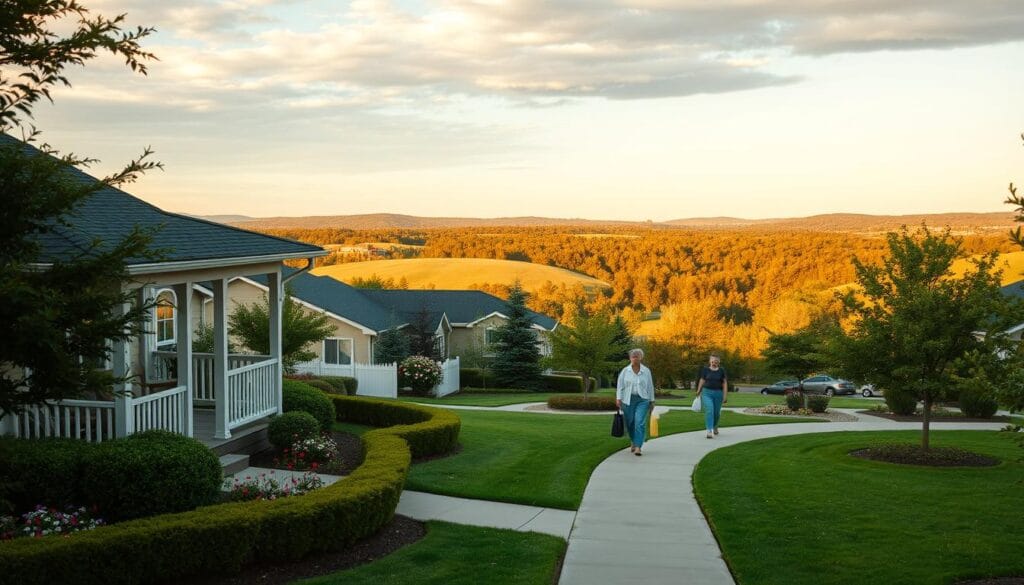Did you know 1 in 5 mortgage applicants aged 70+ secured loans in 2023? Lenders don’t count candles on birthday cakes – they evaluate income stability and repayment capacity. Federal law explicitly bans age-based loan denials under the Equal Credit Opportunity Act, creating opportunities many retirees never knew existed.
The housing market sees growing interest from empty nesters exploring new locations or downsizing. Unlike younger buyers, this group often enters transactions with decades of savings and equity. Some even leverage reverse mortgage options to enhance their financial flexibility during this life stage.
Modern retirees redefine traditional timelines. They’re choosing properties with accessibility features, lower maintenance, and proximity to healthcare. While monthly income verification replaces career-length employment history, lenders increasingly recognize retirement accounts and investment portfolios as valid proof of financial health.
Key Takeaways
- Federal laws protect against age discrimination in mortgage applications
- Retirement income sources count toward loan eligibility
- No legal limits exist for property ownership based on age
- Market trends show increased active-adult community development
- Financial planning should prioritize long-term housing costs
Overview of Home Purchase Readiness for Seniors

Over 40% of Americans aged 65+ now own property without mortgages, showcasing their active role in real estate. This group often prioritizes accessibility, manageable living spaces, and community connections when exploring properties. Recent market shifts reveal retirees increasingly value properties that support multigenerational lifestyles while accommodating evolving health needs.
Understanding the Senior Home Buying Landscape
Today’s buyers aged 55+ represent 28% of active house hunters – a segment growing three times faster than the general market. Unlike younger demographics, this group leverages existing assets like paid-off properties or investment portfolios to secure financing. Lenders now recognize retirement income streams, including pensions and Social Security, as valid qualification factors.
| Trend | Common Preferences | Financial Factors |
|---|---|---|
| Downsizing | Single-level layouts | Equity from previous homes |
| Relocation | Accessibility features | Retirement account income |
| Community engagement | Proximity to healthcare | Low-maintenance designs |
Key Considerations for Retirement Homeownership
Long-term affordability remains crucial. Experts recommend budgeting for 15-30 years of ownership costs, including property taxes and adaptation upgrades. Location choices often hinge on proximity to family networks or specialized medical services. “The goal isn’t just buying a house – it’s securing a lifestyle,” notes a HUD-certified housing counselor.
Borrowers aged 65+ can explore conventional loans through top mortgage lenders, provided they meet credit requirements. Fixed-rate options offer stability, while adjustable-rate mortgages suit those planning shorter occupancy periods. Always compare lender terms using tools like annual percentage rate (APR) calculators.
Benefits of Homeownership for Seniors

Owning property after retirement offers more than four walls and a roof. It creates lasting financial stability through equity growth and tax savings. These advantages work together to protect long-term budgets while fostering personal freedom.
Wealth Preservation Through Real Estate
Every mortgage payment builds equity – a living savings account that grows with property values. Retirees often see 3-5% annual appreciation, turning their residence into a safety net. Three key financial perks stand out:
- Mortgage interest deductions lower taxable income
- Many states reduce taxes for owners over 65
- Paid-off properties eliminate monthly rent fluctuations
Over 30 states offer special exemptions, with some freezing property valuations at retirement-age levels. Pair these savings with Social Security optimization strategies for maximum budget efficiency.
Roots That Nourish Well-Being
Ownership fosters emotional stability through permanent neighborhood ties. Unlike rentals, owned spaces can be adapted for accessibility needs without landlord approvals. “Controlling your environment reduces stress during life transitions,” observes gerontology expert Dr. Linda Harris.
Key non-financial benefits include:
- Stronger social connections through community involvement
- Freedom to modify layouts for aging needs
- Pride of ownership boosting mental health
These factors explain why 68% of older Americans prefer owning over renting. The combination of financial security and personal autonomy makes property a cornerstone of retirement planning.
Navigating Mortgage Options in Retirement

Retirement doesn’t limit your financial choices—it introduces specialized lending solutions. Lenders now offer products tailored to diverse retirement scenarios, from predictable payment plans to equity-access strategies.
Fixed-Rate and Conventional Loan Insights
Fixed-rate mortgages provide stability for those managing fixed income streams. These loans lock in consistent mortgage payments for 15-30 years, simplifying budget planning. Approval typically requires:
- Credit scores above 620
- Documented retirement income (pensions, investments)
- Debt-to-income ratios below 45%
Conventional loans often suit buyers planning long-term occupancy. “Many retirees appreciate knowing their housing costs won’t change,” explains mortgage advisor Carla Rodriguez.
Reverse Mortgage Options Explored
Reverse mortgages let homeowners aged 62+ convert equity into tax-free funds without monthly payments. The FHA-insured HECM program dominates this market, requiring:
- Primary residence status
- Ongoing property tax/insurance payments
- 55-70% down payment for purchase scenarios
These loans balance access to cash with obligations to maintain the property. Funds become repayable if the owner permanently relocates or passes away. Compare this carefully against traditional mortgage structures to determine optimal fit.
Income and Credit Considerations for Senior Homebuyers

Securing a mortgage after retirement requires understanding how lenders evaluate non-traditional income streams. Documentation plays a critical role, with specific rules governing how different revenue sources get counted toward loan eligibility.
Qualifying with Retirement Income and Assets
Lenders accept multiple income types for mortgage approval:
- Social Security benefits (show award letters)
- 401(k)/IRA distributions (must continue 3+ years)
- Pension payments (verified through employer documents)
Investment accounts require two years of dividend history, with stock portfolios valued at 70% of current worth. Proceeds from sold properties count if deposited 60-90 days before application. “Consistency matters more than dollar amounts,” advises mortgage underwriter Mark Teller.
Maintaining a Strong Credit Profile
A credit score above 680 unlocks better rates. Retirees should:
- Keep credit utilization below 30%
- Avoid closing long-held accounts
- Monitor reports for errors quarterly
Those with substantial assets but limited monthly income might consider asset depletion loans. These divide total savings by 360 months to create “income” for qualification. A $500,000 portfolio could generate $1,388/month in lender calculations.
Property and Maintenance Considerations for Aging in Place

More than 80% of older adults prefer staying in familiar environments as their needs evolve. Strategic planning transforms houses into lifelong sanctuaries through smart upgrades and practical maintenance strategies.
Home Modifications for Safety and Accessibility
Essential upgrades focus on preventing falls and simplifying daily tasks. Leverage these key features when evaluating properties:
- Step-free entries with non-slip surfaces
- Bathrooms with reinforced walls for grab bars
- 36-inch doorways for potential wheelchair access
| Feature | Purpose | Average Cost |
|---|---|---|
| Walk-in shower | Reduces stepping hazards | $3,500-$8,000 |
| Smart lighting | Improves nighttime visibility | $200-$1,500 |
| Lever door handles | Eases grip challenges | $50-$150 per door |
Managing Ongoing Maintenance and Upkeep
Regular property care becomes critical for sustaining safe living conditions. Many aging-in-place programs offer grants for essential repairs. Consider these approaches:
- Hire vetted contractors for seasonal tasks
- Install smart sensors for leak detection
- Create a maintenance fund covering 2% of property value annually
Budgeting tools from retirement income guides help balance modification expenses with daily costs. Prioritize upgrades offering both immediate benefits and long-term functionality.
Real Estate and Community Insights for Seniors
What makes a neighborhood truly welcoming for older adults? The answer lies in thoughtful design and supportive infrastructure. Communities catering to this demographic blend practical accessibility with opportunities for engagement.
Selecting Age-Friendly Neighborhoods
Top locations prioritize three essentials: safety, convenience, and social connectivity. Walkable areas with shaded sidewalks and ample benches encourage outdoor activity. Proximity to medical facilities often ranks higher than nightlife options for this group.
| Feature | Ideal Standard | Benefit |
|---|---|---|
| Healthcare Access | Within 5-mile radius | Reduces travel stress |
| Public Transit | ADA-compliant options | Maintains independence |
| Recreation | Community centers | Supports social bonds |
Many mature buyers seek neighborhoods with mixed-age populations rather than exclusive 55+ developments. This approach balances peer interactions with intergenerational connections.
The Role of Specialized Real Estate Agents
Seasoned professionals bring unique value to later-life transactions. Real estate agents focusing on older clients often:
- Understand accessibility requirements
- Explain documents in plain language
- Coordinate virtual tours for mobility-limited buyers
“The right agent becomes your advocate through every form and inspection,” shares broker Elaine Thompson, who’s helped 200+ retirees relocate. These specialists frequently partner with retirement planning strategists to align housing choices with long-term financial goals.
Family involvement should complement rather than override decisions. A trusted real estate agent can mediate conversations about budget and safety features while respecting the buyer’s autonomy.
Navigating Financial Assistance and Benefits
Smart financial planning unlocks hidden resources that protect budgets and enhance living conditions. Many older homeowners overlook valuable programs designed to reduce ownership costs while maintaining independence.
Utilizing Tax Deductions and Incentives
Federal tax benefits can slash annual expenses significantly. Mortgage interest deductions remain available even after retirement, while property tax write-offs help offset rising costs. Some states freeze valuations at age 65, locking in predictable payments for life.
Capital gains exemptions prove particularly valuable when downsizing. Married couples can exclude $500,000 in profits from primary residence sales. Pair these strategies with targeted deduction approaches to maximize savings.
Exploring Government and Non-Profit Programs
The Department of Veterans Affairs offers adapted housing grants up to $101,754 for qualifying individuals. HUD’s Housing Counseling Program connects participants with experts who navigate assistance applications.
Local initiatives often provide:
- Energy bill assistance through LIHEAP
- Emergency repair grants from community foundations
- Free safety inspections via Area Agencies on Aging
Organizations like NCOA maintain databases of 2,500+ assistance programs. Their BenefitsCheckUp tool matches homeowners with relevant benefits in under 15 minutes. “These resources transform unmanageable costs into sustainable budgets,” notes financial counselor Diane Marlow.
Expert Advice on home purchase readiness seniors
Seasoned professionals emphasize three pillars for successful transactions: clear financial assessment, realistic budgeting, and strategic partnerships. Recent surveys show 62% of older buyers benefit from customized planning tools when evaluating long-term commitments.
Mapping Financial Foundations
Begin by analyzing income streams against projected expenses. Lenders typically require proof that housing costs won’t exceed 35% of monthly cash flow. Key considerations include:
- Loan terms matching anticipated years in the property
- Emergency funds covering 6-12 months of living expenses
- Potential tax implications on retirement assets
Review current refinance rates if considering adjustable-rate options. Fixed-rate mortgages often provide better predictability for fixed-income budgets.
Building Your Advisory Team
Specialized real estate agents and financial planners offer critical insights. They help align property choices with healthcare needs and legacy goals. Regular consultations ensure:
- Proper valuation of physical assets during negotiations
- Understanding age-related maintenance cost trends
- Optimization of cash reserves through withdrawal strategies
As wealth manager Rachel Torres advises, “Your advisory circle should challenge assumptions while respecting your vision for the coming years.” This collaborative approach transforms complex decisions into achievable steps.

